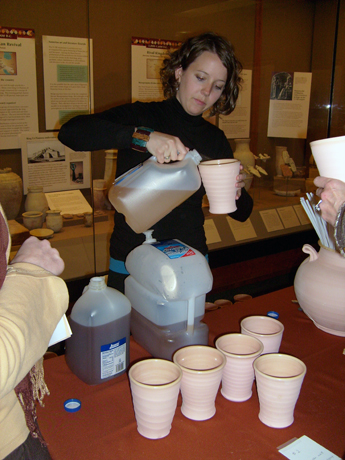| Sun | Mon | Tue | Wed | Thu | Fri | Sat |
|---|---|---|---|---|---|---|
| 1 | 2 | 3 | 4 | 5 | ||
| 6 | 7 | 8 | 9 | 10 | 11 | 12 |
| 13 | 14 | 15 | 16 | 17 | 18 | 19 |
| 20 | 21 | 22 | 23 | 24 | 25 | 26 |
| 27 | 28 | 29 | 30 | 31 |
CATEGORIES
RECENT ENTRIES
BLOG ROLL
Nectar of the Babylonians


Students socializing at Jimmy’s over a pint of beer know that they’re participating in an age-old practice, but few likely realize just how old. Even before the dawn of recorded history, beer-brewing was widespread throughout the ancient Near East. In a presentation at the Oriental Institute last Wednesday, Kathleen Mineck, a PhD candidate in Near Eastern Languages and Civilizations, coupled a lecture on beer in the ancient world with a tasting of her own home brews, prepared in the Sumerian manner.
Beer’s basic ingredients—yeast, water, and barley or wheat—are the same ones used to make bread, and ancient bakers often made the two side-by-side.. The Greek soldier of fortune Xenophon recounted finding that “barley-wine,” as he described beer, was made in every home in Armenia. No bacteria or pathogen could grow in beer because of the alcohol, making it safer to drink than water. Sumerians considered beer a gift from the gods, Mineck said, and many artifacts show people drinking it both recreationally and ritually.
Mineck, whose husband was a home-brewer long before she began her research, attempted to recreate the beers using the same or similar ingredients available in ancient Mesopotamia. The process required some guesswork: while the basic brewing process of the ancients is well known, the precise spices and flavorings used are obscure. In the end, guests sampled beers flavored with dates, with grapes (“wine-beer”), and with honey. Drinks were served in Mesopotamian-style ceramic mugs made for the occasion and stamped with the symbol of the goddess Inanna, patroness of love and fertility.
Anheuser-Busch and Heineken needn’t worry about their market share being threatened by a flood of Assyrian ales: this blogger thought the beer tasted weak and flat (partly because of the absence of hops, an innovation of the past millennium, and partly because the beer was served at room temperature.) The date-beer and wine-beer both had too much fruit, though the honey wheat beer was, as Xenophon wrote, “a very pleasant drink to those accustomed to it.”
Benjamin Recchie, AB’03
November 10, 2008
